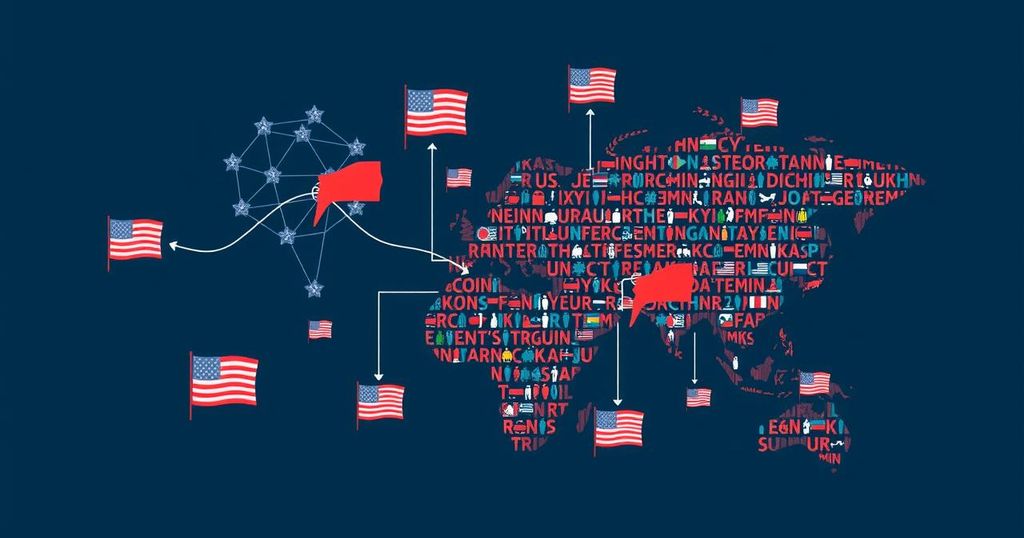Global Implications of the U.S. Presidential Election

The upcoming U.S. election has critical implications for global governance, impacting international relations across various sectors such as trade, climate change, and military alliances. Vice President Kamala Harris and former President Donald Trump represent two dramatically different visions, affecting how nations respond to issues like Israel-Palestine relations, U.S.-China relations, European stability, and climate policy. Each candidate’s potential victory will reverberate significantly across the globe, with outcomes that may alter the dynamics of major international conflicts and cooperative efforts to address global challenges.
The upcoming U.S. presidential election poses significant implications for the global landscape, influencing issues from international conflicts to climate change policies. With Vice President Kamala Harris and former President Donald Trump as the primary candidates, the world observes closely, contemplating the direction the United States will take as a superpower. This election not only amplifies divisions within the United States but also reverberates across international borders, prompting various global actors to consider the potential outcomes. In Israel, the prevailing sentiment favors Donald Trump, who is perceived to support Israeli interests fervently. However, regardless of the election outcome, many believe that the Israeli government’s stance on Palestinian statehood will largely remain unchanged. If elected, President Harris might advocate for engagement in Middle Eastern diplomacy, though it is unlikely she would disrupt military support to Israel. Conversely, Trump’s unpredictability could lead to an ambiguous relationship with Israeli Prime Minister Benjamin Netanyahu. The situation in Ukraine remains precarious, with Trump blaming President Zelensky for Russia’s aggression. Ukrainians fear that a Trump presidency may result in unfavorable peace terms favoring Russia, while a Harris administration could ensure continued military support. Interestingly, Russian President Vladimir Putin perceives minimal differences between Trump and Harris, believing both may combine a less committed approach to Ukraine than President Biden. China, regardless of its victor, will face a hawkish U.S. stance. Discussions in Beijing reveal mixed sentiments; while Trump’s tariff policies could hinder Chinese exports, his potential tacit support on Taiwan may appeal to the Chinese leadership. In terms of global alliances, a Harris administration would likely enhance diplomatic relations in the Asia-Pacific region, which could restrict China’s influence. For Europe, the election represents a decisive moment, with varying opinions on the implications of a Trump victory. His emerging popularity among European far-right factions may challenge a united European front, while his economic policies could jeopardize trade relations. A Harris administration might encourage European self-sufficiency and a renewed focus on China, departing further from the robust transatlantic alliance of the past. The election also revolves around the broader issues of trade and tariffs. With Trump prioritizing increased tariffs, economists warn about potential trade wars which could lead to economic downturns. Conversely, Harris is likely to continue targeted tariffs on security grounds but would not escalate tensions to the extent Trump proposes. In Africa, Harris’s heritage presents her as an appealing candidate due to her ties to the continent, while some view Trump as an effective leader. However, climate policies emerge as significant; a continuation of Biden’s renewable energy agenda under Harris contrasts with Trump’s potential to rollback on emissions regulations, impacting the global climate effort profoundly. The relationship between the U.S. and Mexico will remain contentious regardless of the outcome, with immigration policies expected to tighten. A Trump presidency foreshadows militarized border tensions, alongside implementation of stringent tariff measures that could further strain U.S.-Mexico trade relations. Despite the already shifting focus towards renewable energy, the scale of transition will depend heavily on the election outcome, particularly concerning U.S. leadership in addressing climate change. Trump’s reluctance to prioritize this area coupled with Harris’s likely continuance of Biden’s agenda signifies crucial stakes for the global climate movement. In summary, the U.S. election will not only dictate the country’s domestic policy direction but also significantly influence global geopolitics, economic conditions, and international relationships, with ramifications that extend well beyond its borders.
The significance of the U.S. presidential election resonates far beyond American shores, as the outcomes may dictate international policy stances on critical issues like climate change, global security, trade, and diplomatic relations. Candidates Vice President Kamala Harris and former President Donald Trump present vastly different visions for America’s role in the world, prompting diverse reactions from global leaders and populations. Their policies will likely determine not only the future of U.S. alliances but the prosperity and stability of multiple regions and nations.
The implications of the U.S. presidential election extend far beyond American politics, positioning the next president to influence international dynamics profoundly. The economic, diplomatic, and environmental policies set forth by either candidate will affect nations across the globe, from pivotal partnerships in Europe to tensions in the Middle East, trade relations with China, and climate initiatives worldwide. As such, the world awaits with anticipation to see how the election results will shape the geostrategic landscape for years to come.
Original Source: www.nytimes.com






